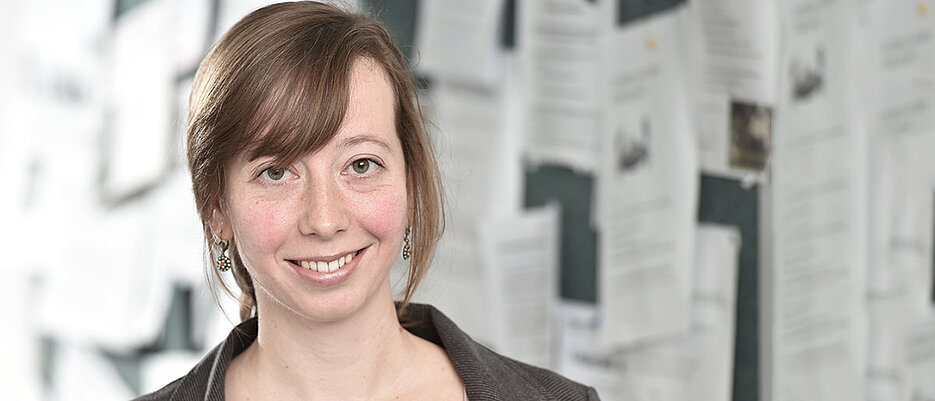More than meets the eye
11/15/2017Psychologists from the University of Würzburg want to study direct eye contact in more detail. Professor Anne Böckler-Raettig has set up an Emmy Noether Research Group for this purpose.

Keeping steady eye contact, prolonged staring, averting an uncomfortable gaze. Our eyes are an essential part of nonverbal communication. Titled "More than meets the eye", the new Emmy Noether Research Group at the University of Würzburg looks into aspects of human interaction related to direct eye contact.
Anne Böckler-Raettig, the group leader, has been pondering the question of which affective and cognitive aspects underlie human coordination and cooperation skills for quite some time.
Human coordination, communication and cooperation usually work efficiently. In recent years, the psychologist has increasingly devoted her attention to identifying the underlying mechanisms. "Often, and that's the good thing, these are the very simple things," says Professor Anne Böckler-Raettig. Simple things such as exchanging looks, either consciously or unconsciously.
Researching direct eye contact
Gaze following, where people automatically tend to follow the gaze of other people, has been well researched. "We do it all the time and often we are not even aware of it. And this has a huge impact," the psychologist explains. She has been holding a junior professorship at the Institute of Psychology of the University of Würzburg since October 2015. This allows people to better understand the perspective of others, i.e. what another person is seeing, what they are interested in or what they want to do or have.
Research has focused less on direct eye contact so far. This is the starting point for the new Emmy Noether Research Group "More than meets the eye: integration, influences and impairments of direct gaze processing" at the University of Würzburg.
The research subject is roughly based on a simple experiment from Böckler-Raettig's time as a PhD. Together with colleagues from the US and Canada she found out that eye contact captures our attention, especially when it occurs suddenly. "This is a rather simple finding to start with. But what intrigues me here is why that is so and how it works," the professor says.
Focus on function and meaning
The research project is structured in three parts. Firstly, the researchers want to determine how direct eye contact works. "What role does the temporal component play in this context?" Anne Böckler-Raettig asks for example. And there is the general question of how this stimulus integrates with other stimuli such as the emotional expression on the face of another person: "I am interested in the overall picture that is created and how the action of looking each other in the eye interacts with other stimuli."
In this field of fundamental research, the scientists use eye-tracking technology, among others. This method presents very simple stimuli to test persons, for example faces that look at them or that look away. The motion of the eyes and the path of the gaze are measured and can subsequently be analysed. For this purpose, the new research group collaborates with Professor Lynn Huestegge (Psychological Methodology) and Professor Winfried Kunde, Head of the Department of Psychology III of the University of Würzburg.
The second part focuses on the significance of eye contact in social interactions and for social understanding. And that applies to both the listener and the speaker. Already in the 60ies attempts were made to study the gaze behaviour in a conversation. The researchers found that gazes meet two purposes: For example: Is the other person listening? "At the same time I am communicating, too, for example just before I stop talking to allow the other person to speak, I usually look them in the eye," Böckler-Raettig explains. But do we understand each other? And if not, why?
Gazes are very important for social interaction
Whether we understand someone has an emotional and a cognitive component. The emotional component, empathy, is about whether someone is capable of telling how another person is feeling. This refers to our ability to relate to the feelings of others - and that is largely an automatic process.
The cognitive angle describes the possibility to change perspective. What does someone think, believe or plan? Here, Böckler-Raettig is intrigued by the following question: "Are people that keep eye contact while listening more empathetic and do they find it easier to change perspective?"
The third part focuses on interaction deficits and how to overcome them. "Some believe that a lot of psychological dysfunctions are also interaction deficits - or else we wouldn't normally notice them," the professor says. Examples include social shyness, adjustment disorders and autism.
Social shyness and adjustment disorders
Social shyness and adjustment disorders are both deficits the scientist wants to examine. "The people affected by these conditions don't know how to behave properly in social situations," Böckler-Raettig says. For example, they have reduced empathy, but this is not their fault. "We know that people who suffer from social shyness have a slightly different gaze behaviour," the psychologist says. "Maybe these very simple mechanisms are causative of our social skills," the professor suggests.
Together with Marcel Romanos, Head of the Department of Childhood and Adolescent Psychiatry at the Würzburg university hospital, she tries to get a better insight into these disorders. One aspect that motivates her is that findings could be integrated into new therapeutic approaches. In this case, learning simple behaviours, for instance relating to eye contact, could have a positive influence on more complex social interactions.
Contact
Prof. Dr. Anne Böckler-Raettig, e-mail: anne.boeckler@uni-wuerzburg.de
The Emmy Noether Programme of the DFG
The Emmy Noether Programme supports researchers in achieving independence at an early stage of their scientific careers. The group of Anne Böckler-Raettig receives funding of up to EUR 800,000 over five years. The money is used for example to finance a postdoc, three PhD students and two assistants.






